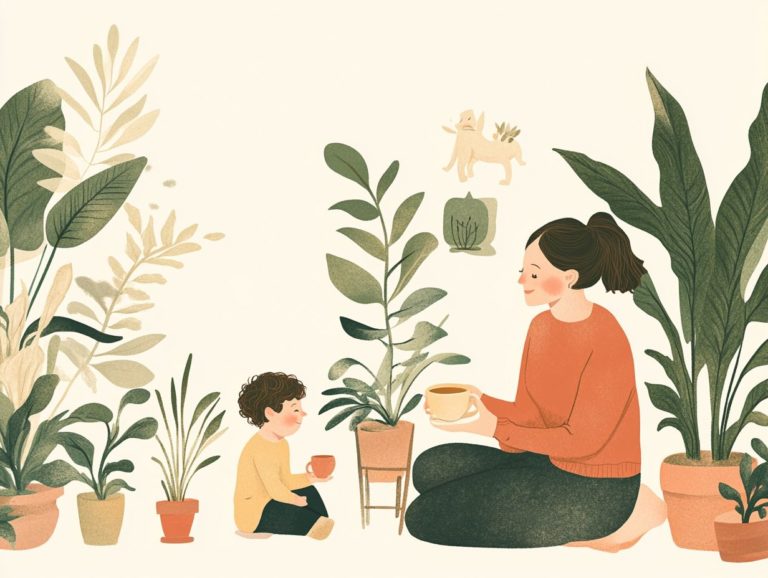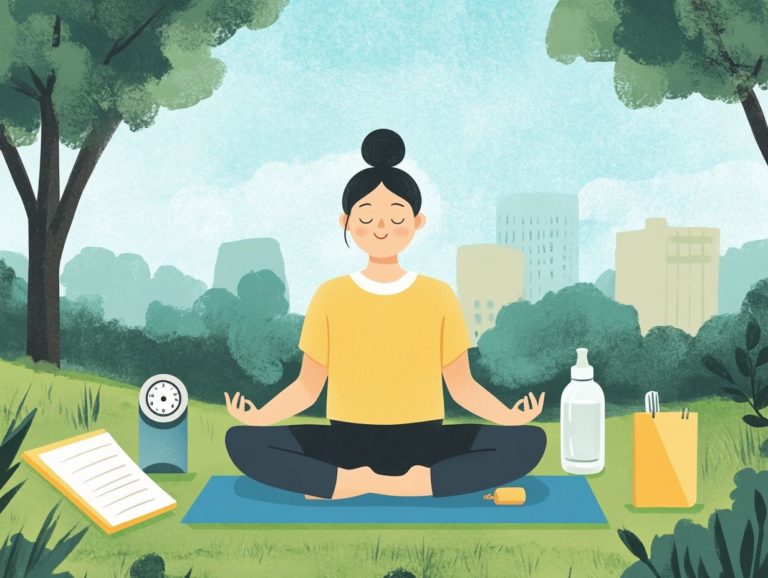5 Ways to Incorporate Play into Self-Care
Incorporating play into your self-care routine can be a transformative approach to enhancing your mental health, managing stress, and elevating your overall well-being.
Whether you explore a new hobby, carve out time for playful activities, or engage in games with loved ones, these joyful pursuits have the power to rejuvenate your spirit, reduce burnout, and foster genuine happiness.
This article delves into five imaginative ways for you to embrace playfulness in your life while also addressing common hurdles and emphasizing the importance of prioritizing fun as an essential component of your self-care plan.
Immerse yourself in this exploration to uncover how a touch of play can usher in significant positive changes, fostering stress reduction and emotional self-care!
Contents
- Key Takeaways:
- 1. Try a New Hobby or Activity
- 2. Schedule Playtime into Your Routine
- 3. Find a Playful Workout Routine
- 4. Play Games with Friends or Family
- 5. Use Play as a Form of Stress Relief
- What Is the Importance of Play in Self-Care?
- How Can Play Benefit Mental Health?
- What Are Some Examples of Playful Self-Care Activities?
- How Can One Overcome the Stigma of Play as an Adult?
- What Are the Potential Obstacles in Incorporating Play into Self-Care?
- How Can One Make Play a Sustainable Part of Their Self-Care Routine?
- Frequently Asked Questions
- How can I easily add play to my self-care?
- How can incorporating play into my self-care routine benefit me?
- Can I incorporate play into self-care if I have a busy schedule?
- What if I struggle to embrace play in my self-care routine?
- Is it possible to incorporate play into self-care without spending money?
- How often should I incorporate play into my self-care routine?
Key Takeaways:

- Explore new hobbies and activities to add variety and fun to your self-care routine.
- Intentionally schedule time for play in your daily or weekly routine to prioritize self-care.
- Incorporate playful exercises, like dance or sports, to boost mood and physical well-being.
1. Try a New Hobby or Activity
Engaging in a new hobby or activity can greatly improve your self-care. It offers a refreshing approach to stress management and emotional well-being while helping you grow, build resilience, and enhance your psychological health.
Hobbies provide an avenue for creative expression. They also create opportunities for mindful living and serve as effective relaxation techniques that combat anxiety and burnout, ultimately enhancing your quality of life.
For instance, when you take up gardening, you not only connect with nature, promoting mindfulness, but also find a therapeutic means to cultivate patience and responsibility.
Similarly, exploring artistic outlets like painting or writing can offer a cathartic release, allowing you to process your emotions in a creative way.
Engaging in activities such as yoga or meditation can help you develop a deeper sense of self-awareness, which is crucial for emotional well-being. In each of these cases, these hobbies not only contribute to a balanced lifestyle but also support positive psychology by fostering new skills and enhancing your overall happiness.
2. Schedule Playtime into Your Routine
Incorporating scheduled playtime into your routine is not just a delightful indulgence; it s a crucial element of your self-care strategy. It promotes stress relief and enhances your overall well-being by encouraging a balanced lifestyle and fostering healthy relationships.
Playtime serves as a refreshing antidote to the pressures of everyday life, offering a much-needed respite that stimulates creativity and strengthens social connections.
By embracing activities that spark joy and laughter, you can effectively manage stress, leading to a positive impact on your mental health and overall well-being.
Sharing these moments of play with friends and family amplifies emotional bonds, reinforcing the social support systems that are essential for navigating life s challenges.
Ultimately, weaving play into your daily life not only cultivates your personal wellness but also enriches your interactions, making it a fundamental component of effective self-care.
3. Find a Playful Workout Routine
Finding a playful workout routine can transform your approach to physical self-care into an enjoyable experience. This enhances not just your physical health but also your emotional well-being, mental health, and mindfulness.
When exercise feels less like a chore and more like a joyful activity, it can truly change your relationship with fitness.
Consider exploring a variety of movement options whether it s lively dance classes, engaging team sports, or delightful outdoor activities like hiking or frisbee. These pursuits provide a sense of community and connection while fostering healthier coping mechanisms and healthy relationships.
You ll find that releasing pent-up energy through play brings joy and laughter, which are crucial for maintaining mental health.
By incorporating playful workouts into your routine, you naturally cultivate personal relaxation techniques. This turns each session into an opportunity for holistic health improvement and anxiety reduction. This shift uplifts your mood and builds resilience, ensuring you maintain balance amid daily challenges.
Start incorporating play into your life today and experience the numerous benefits it can bring!
4. Play Games with Friends or Family

Playing games with friends or family not only strengthens your social bonds but also plays a crucial role in your social self-care. It facilitates emotional well-being and offers stress relief through shared experiences and laughter, promoting healthy coping.
Whether you gather in a cozy living room or connect through an online platform, these interactions create a sense of belonging that deepens connections among everyone involved. Engaging in playful activities allows you to escape daily pressures and come together, forming support networks that effectively combat feelings of isolation and anxiety.
Sharing joys and challenges during gaming moments can elevate spirits and foster resilience, making games an ideal avenue for community support. Ultimately, by enjoying these gaming experiences, you not only enhance your emotional health but also contribute to a culture of understanding and care among your peers.
5. Use Play as a Form of Stress Relief
Playing is a fantastic way to relieve stress and boost your life! Incorporating activities that engage your mind, encourage mindfulness, and foster ways to handle stress better amidst daily stressors can profoundly elevate your quality of life. It is a key aspect of taking care of your mental health and personal growth.
Whether you find joy in playful interactions with friends or immerse yourself in creative hobbies, these activities offer a refreshing escape. They allow you to fully embrace joy and can be part of your self-care toolbox.
For instance, when you indulge in painting or crafting, you shift your focus away from stress, opening a pathway for self-expression while inviting a sense of calm. Activities like gardening or hiking not only captivate your interest but also promote both physical well-being and emotional relaxation. These activities can significantly contribute to anxiety reduction.
By weaving playful elements into your daily routine, you cultivate a healthier mindset, transforming self-care from a mere obligation into a cherished ritual that enriches your life.
What Is the Importance of Play in Self-Care?
The significance of play in your self-care regimen cannot be overstated; it plays a vital role in managing stress and enhancing emotional well-being. By nurturing your personal strengths and fostering healthy habits, it contributes to a balanced lifestyle.
When you engage in playful activities, you can fundamentally transform your approach to stress, building resilience and finding a refreshing distraction from daily pressures. Experts like Elizabeth Scott, PhD, highlight that incorporating play into your routine not only alleviates tension but also enhances your creativity and problem-solving abilities. Her research indicates that adults who carve out time for playful pursuits experience a marked decrease in anxiety and an uptick in overall life satisfaction.
Testimonials from those who have integrated play as a key aspect of self-care reveal that these activities deepen connections with others, enriching your social and emotional landscape. Embracing play is not merely an indulgence; it s a powerful tool for nurturing your mental health and enhancing the quality of your life.
Start incorporating play into your life today for a happier, healthier you!
How Can Play Benefit Mental Health?
Engaging in play can bring you profound benefits for your mental health. It enhances your emotional well-being, promotes resilience, and equips you with effective coping skills to manage stress and anxiety. Play is an essential part of mental self-care and emotional self-care.
Numerous studies have underscored the link between play and improved mental health outcomes. Play serves as a vital outlet for stress relief. By immersing yourself in playful activities, you can significantly lower cortisol levels, the hormone that the body produces in response to stress, while also allowing yourself to express emotions more freely. This insight is echoed in research by Rachel Goldman, PhD and Sabrina Romanoff, PsyD.
Collaborative play fosters social bonds and enriches your emotional well-being. It creates a supportive network around you. This interaction cultivates emotional resilience and equips you with essential coping skills, enabling you to navigate life’s challenges with greater ease. Being part of such activities connects you with a support group.
The simple act of play serves as a powerful antidote to the pressures of modern life. It promotes a healthier mind and spirit. Engaging in play can significantly enhance your well-being.
What Are Some Examples of Playful Self-Care Activities?

Consider exploring a variety of playful self-care activities that can elevate your emotional well-being and foster relaxation. Engaging in creative hobbies, participating in sports, or joining group games can all serve as delightful avenues for physical and mental rejuvenation. These activities are essential elements of spiritual self-care and community self-care.
Imagine the joy of painting or crafting. Picture the invigorating experience of hiking or biking through nature. These pursuits cater to diverse interests and preferences, ensuring that there s something for everyone. They also contribute to healthy habits and lifestyle changes.
Individual activities, such as journaling or practicing yoga, offer a serene escape. Meanwhile, group endeavors like team sports or dance classes encourage social connections and laughter.
You might also enjoy the camaraderie of trying out new board games or hosting a movie night with friends. These activities can infuse your life with community and joy. By incorporating a blend of these enjoyable experiences into your routine, you can significantly enhance your emotional resilience, reduce anxiety, and cultivate a deeper sense of relaxation.
How Can One Overcome the Stigma of Play as an Adult?
Overcoming the stigma associated with adult play requires a shift in perspective. It s important to recognize that engaging in play is not just a frivolous pastime; it s essential for your emotional well-being. Play fosters personal growth and encourages beneficial lifestyle changes that contribute to overall well-being.
Incorporating playful activities into your life can lead to enhanced creativity, reduced stress, and improved social connections. Dr. Stuart Brown, a leading researcher on play, wisely notes, “The opposite of play isn’t work; it’s depression.” This insight highlights the significance of embracing playful moments, no matter how small they may seem, as a form of emotional self-care.
Consider an adult who began hosting game nights with friends. They reported feeling more connected and energized. This shows that simple changes can bring remarkable improvements to emotional health and psychological health. By championing playfulness, you can nurture your own joy while inspiring those around you to embrace a more balanced and enriched lifestyle.
What Are the Potential Obstacles in Incorporating Play into Self-Care?
Potential obstacles in incorporating play into your self-care routine can include societal expectations, feelings of guilt, and the lingering misconception that play is merely frivolous. These barriers can significantly hinder your ability to manage stress and maintain emotional well-being.
When these challenges arise, you may find yourself neglecting activities that bring you joy and relaxation. This neglect only heightens stress levels and diminishes your overall health. Many individuals feel a compelling pressure to prioritize responsibilities over leisure, convinced that productivity should always take precedence over pleasure. This mindset can contribute to burnout and impact your mental health.
To counteract this, consider setting aside specific times for playful activities, treating them as essential appointments for your well-being. Embracing the idea that play is a vital component of a balanced life can foster healthier habits, allowing you to weave moments of joy seamlessly into your daily routine. In doing so, you can significantly reduce stress and enhance your emotional resilience.
How Can One Make Play a Sustainable Part of Their Self-Care Routine?
Integrating play into your self-care routine requires a thoughtful approach. Intentionally carve out time for playful activities, transforming them into regular practices that foster healthy habits and elevate your emotional well-being.
To achieve this, dedicate a specific time each week solely for play whether that means immersing yourself in a cherished hobby, venturing outdoors, or engaging in spirited group games. Embrace variety by regularly introducing new activities to keep the experience invigorating and enjoyable. This can become an essential part of your self-care plan.
This dedication to playful engagement can profoundly enhance your ways to handle stress, providing a refreshing escape from daily stressors while cultivating a more resilient mindset. Ultimately, these consistent and diverse playful practices will nourish your overall mental health, leading to a greater sense of joy and fulfillment in your life.
For additional insights, you can find resources from the World Health Organization, American Psychological Association, and National Institute of Mental Health helpful.
Frequently Asked Questions

How can I easily add play to my self-care?
1. Dedicate time for fun activities: Set aside specific blocks of time in your schedule for activities that bring you joy, such as playing a sport, painting, or dancing. This can be an integral part of your self-care toolbox for managing stress.
2. Use your imagination: Tap into your inner child and let your imagination run wild. You can do this by creating a vision board, writing in a journal, or simply daydreaming.
3. Try something new: Incorporating play into self-care means stepping out of your comfort zone. Pick up a new hobby, attend a workshop, or try a new form of exercise. Engaging in creative hobbies can be both rewarding and therapeutic.
4. Connect with others: Play doesn’t always have to be a solo activity. Invite friends or family to join you in a game night, outdoor adventure, or any other fun activity you enjoy. Engaging in social self-care can improve your social connections.
5. Make everyday tasks more enjoyable: Even mundane tasks like cooking or cleaning can be turned into playtime. Listen to music, sing, or dance while completing these tasks to make them more enjoyable. Incorporating play into your daily routine can foster a sense of mindful living.
Make play a priority for your mental health today!
How can incorporating play into my self-care routine benefit me?
Incorporating play into your routine can include positive psychology practices that elevate your overall mood!
1. Reduce stress and anxiety: Play can be a great stress reliever. It helps you relax, which positively impacts your mental health. Play is also an excellent strategy for anxiety reduction.
2. Boost creativity and problem-solving skills: Play allows your mind to wander and think outside the box. This enhances your creativity and problem-solving abilities.
3. Improve physical health: Engaging in physical play, such as sports or outdoor activities, can improve your physical health and overall well-being. It can also be a form of physical self-care that enhances your quality of life.
4. Increase social connections: Playing with others builds social connections. This strengthens relationships, contributing to your overall happiness and well-being.
5. Enhance productivity: Taking breaks to incorporate play into your routine can improve your productivity. It gives your mind a chance to rest and recharge. Regular play also supports the development of healthy habits.
Can I incorporate play into self-care if I have a busy schedule?
Yes! You can incorporate play as part of your broader self-care plan to manage stressors and enhance your quality of life.
Even with a busy schedule, you can find ways to incorporate play into your self-care routine. Try setting aside small pockets of time throughout your day for short bursts of play, like a quick dance break or a game of Sudoku!
What if I struggle to embrace play in my self-care routine?
Consulting resources like Verywell Mind or experts such as Elizabeth Scott, PhD, Rachel Goldman, and Sabrina Romanoff, PsyD can provide valuable insights.
If play feels uncomfortable, start small. Gradually increase the amount of playtime. Try different forms of play until you find one that resonates with you! This can help you develop healthy coping strategies.
Is it possible to incorporate play into self-care without spending money?
Absolutely! Many self-care activities don’t require spending money and can still provide significant benefits to your emotional well-being and mental health.
There are plenty of ways to incorporate play into your self-care routine without spending money. You can take a walk in nature, listen to music, or play a board game with friends. Get creative and think of free or low-cost ways to have fun and play! You can also explore mindfulness practices and deep breathing exercises as part of your routine.
How often should I incorporate play into my self-care routine?
It’s important to incorporate play into your self-care routine regularly. Aim for at least 30 minutes of playtime each day! Even a few minutes of play can have a positive impact on your overall well-being. Find a frequency that works for you and make it a consistent part of your routine. This will contribute to stress reduction and enhance mental well-being.
Start incorporating play into your life today! You’ll be amazed at the benefits it brings!






